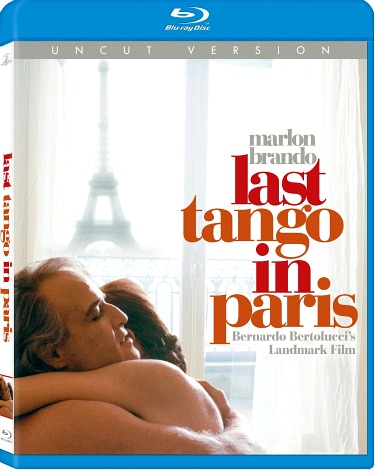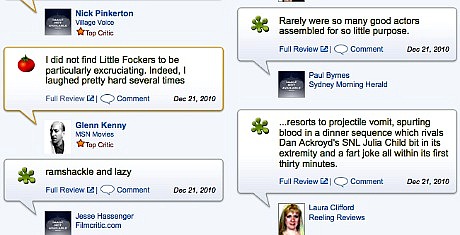Oh my God…a 2010 compilation montage that actually pays attention to what the year’s films were about — what they said, felt, emoted, conveyed, shared. And has some good visceral whizflashbang in the bargain. It took three tries before we made it, but thanks, Matt Zoller Seitz! [Update: I had to take the embed code down because the video automatically launches when the page is refreshed.]
Day: December 22, 2010
Fromers
Okay, who’s the MGM Home Entertainment art director who ordered that the Eiffel Tower be pasted in the background? In so doing, he/she was presuming that some potential buyers may, despite the title, not fully understand which European city this renowned 1972 Bernardo Bertolucci film takes place in. So he/she used a felt-tip pen. The basic idea is to appeal to the schmuck tourists who go straight to Times Square when they hit Manhattan, and who loved When In Rome.

Faint Praise
Of the three 2010 montage reels that have appeared on YouTube this month, Kees van Dijkhuizen‘s is the best. During the early and concluding portions, that is. But most of it, like the other two, is still too whizflashbang. It has a bit more dialogue and seems to actually toy with the themes, emotions and characters that were the actual brick and mortar of 2010 films. But too much of it defaults to GenY eye-candy flashcrap. All hail Greenberg!
Here are the othe rtwo — Filmography 2010 and 2010 Cinescape.
Calculus
When I was launching this site five and a half years ago I was told that the dash between “Hollywood” and “Elsewhere” would be bad for traffic. It probably was in the early days, so in ’05 I asked the guy who ran www.hollywoodelsewhere.com, a deadbeat site if I ever saw one, if he wanted to sell. He said “okay, $10 grand.” I didn’t even reply. Early this month he got in touch again, saying he wants to give me the opportunity to purchase the domain “before we list it on sedo and other domain-selling sites.” I could be wrong, but I’m not convinced it’s even worth having.
Year's Worst Film?
There are three reasons why Little Fockers didn’t get an absolute zero rating on Rotten Tomatoes, and MSN critic (not to mention Hollywood Elsewhere’s own) Glenn Kenny is one of them. His curiously amiable non-condemning review plus two other passes resulted in this plastic poison IV comedy getting an 8%, which is fitting but not the historic blank-out I was hoping for.

“It must be said I did not find Little Fockers to be particularly excruciating,” Kenny wrote. “Indeed, I laughed pretty hard several times. My father-in-law, whom I brought to the screening as a kind of experiment, can testify to this. It eventually settles into an amiably funny groove that holds steady” for the most part. In fact, Kenny says, “It’s kind of cute.”
There’s no accounting for taste in humor. You can’t stop people from laughing at a film that reeks of creative lupus at every turn. You can’t instruct or berate someone into not liking a terrible movie. But if there was some sort of secret elite tribunal that considered and occasionally meted out punishment to critics for not just circulating deeply offensive reviews but for being dead fucking wrong, Kenny’s indictment would be a fait accompli.
"Hard, Isolate, Stoic"
“In some ways, much like Charles Laughton‘s Night of the Hunter, which the Coens quote both musically and visually, True Grit is a parable about good and evil,” writes N.Y. Times critic Manohla Dargis. “Only here, the lines between the two are so blurred as to be indistinguishable, making this a true picture of how the West was won, or — depending on your view — lost.”
Blurred indeed. As in “what’s going on here, if anything?” As I said in my original review, True Grit is “indisputably solid and grade-A as far as those attributes go, but it’s essentially a cold and mannered art western that matters not.”
Heart
Marshall Fine‘s interview with Biutiful director-cowriter Alejandro Gonzalez Inarritu, which he did, I suspect, at the same time I did my Inarritu chat in early November, has some truly sublime quotes:
(a) “I joke that 60 years ago, [Luis] Bunuel went to Mexico to shoot Los Olvidados and, 60 years later, this is my version, shot in Barcelona…I wanted to shoot in my own language[ and] it’s the first film I did in Europe, and the food is fantastic.”
(b) Biutiful‘s story “came from sitting in a doctor’s office [and] seeing another patient emerging after hearing obviously bad news. I thought about what it would be like going out knowing things were changed forever. So I asked the question: What if I knew I had 90 days to be on planet Earth? And that’s where everything departs from.
(c) “When someone says the film is bleak, I hate it. To me, bleakness is 20 or 30 lives being lost in a movie with lots of guns and explosions – and yet there’s not one life you care about. To me, that is bleakness. But this film is a celebration of how important one life is. I knew the consequences of making it. It was not accomplished easily to appeal to the taste of the Starbucks audience. I feel lighter, in a good way.”
(d) “Biutiful is about life, observed from an ending. If you put the camera at the end of the road and observe, it’s more profound. It’s not about death; it’s an homage to a life being lived.
(e) “I started shooting this the month of the financial collapse. This film is like wine that’s been aged for years. This is not a frappuccino, milk and honey and sugary for the audience. [But] just the release of Biutiful is a reason to celebrate…I would say that it is an act of resistance against the intoxicating culture we live under [and] the dictatorship of corporate thinking…at least it’s an attempt to survive.”
(f) “I would love, in a way, to find something that’s not mine, that would take me out of the burden of the personal journey, just to be a director for hire. I’d like to be a craftsman who’s putting together a table he didn’t design. But an apple tree produces apples. My process is very long and exhausting. I can’t escape from that.”
Drive Hard
Gone in Sixty Seconds + Grindhouse aesthetic + Nic Cage’s tax debt goading him to do almost anything + 3D whoopee cushion = popcorn flatulence.
"Little Bit of a Crash Momentum"?
Gold Derby‘s Tom O’Neil and Deadline‘s Pete Hammond answer two key questions: (1) Why has Hammond ditched The King’s Speech?, and (2) Can The Fighter pull off an upset? (Take note, incidentally, that Hammond has The Fighter in second place above The King’s Speech in his rankings.)
